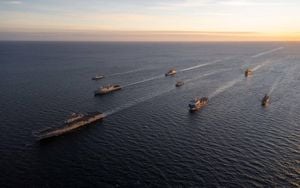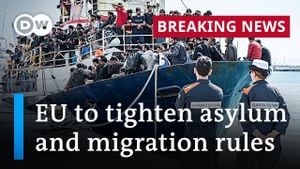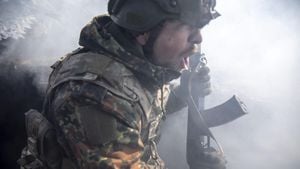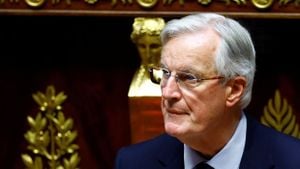Prime Minister Justin Trudeau recently found himself at Mar-a-Lago, the luxurious estate owned by U.S. President-elect Donald Trump. This meeting took place on the evening of November 30, 2024, and was surrounded by significant tension over Trump's threats to impose hefty tariffs on Canadian imports. The gathering was described as both social and pragmatic, offering Trudeau a chance to discuss these looming tariffs among other bilateral issues with Trump.
Prior to the dinner, Trump had already rattled Canada's political circles with his stated intent to introduce a staggering 25% tariff on all Canadian products. This drastic financial measure was supported by his claims about Canada's border controls being inadequate, especially concerning the flow of illegal immigrants and drugs. Speaking to reporters after the fact, Trudeau expressed optimism about the dinner, branding it as “an excellent conversation” focused not only on tariffs but also on joint concerns related to the drug crisis and regional security.
Upon arrival at the estate, Trudeau was joined by Public Safety Minister Dominic LeBlanc, and together they faced Trump's provocative humor and serious economic threats. According to reports, during the meal, Trump jokingly suggested if Canada couldn’t handle the economic fallout from his proposed tariffs, it might as well become the 51st state of the U.S. While some observers noted the lighthearted nature of this comment, others, including LeBlanc, confirmed it was intended as banter rather than serious policy discussion.
Trump's quip elicited laughter at the table but also highlighted the underlying tension between the two leaders. LeBlanc indicated the evening was not devoid of meaningful conversation, stating, “It was, of course, in no way a serious comment,” and emphasized the warmer relations being cultivated through such meetings, which could serve greater diplomatic aims.
Following this dinner, Trudeau was set to brief the opposition leaders about the outcomes of his meeting with Trump. This briefing, expected to occur the following Tuesday, was particularly significant as it aimed to address Trump’s tariff threats and Canada's strategies to manage border security. Amid political critique, particularly from Conservative Leader Pierre Poilievre, Trudeau's government was urged to bolster security efforts at the Canada-U.S. border, which might sway U.S. policymakers to reconsider the implementation of tariffs.
Poilievre's criticism came swiftly after the Mar-a-Lago meeting, where he claimed Trudeau failed to secure any tangible gains from the encounter. He lamented, saying, “What gains did we hear from Mr. Trudeau? None.” Echoing concerns shared by many economists, Poilievre emphasized the possibility of these tariffs severely harming the Canadian economy, forecasting losses extending beyond the borders of Canada and affecting American businesses relying on Canadian products.
Reports indicated turmoil within the Canadian political fabric as many viewed the tariffs as mere posturing by Trump, intended to rally his base rather than enforce lasting economic policy. With Trump emphasizing strict measures against cross-border immigration and drug importation, Trudeau’s team was reportedly advised on potential enhancements of border security which they currently lack. Measures discussed included acquiring advanced surveillance equipment like drones and helicopters to monitor the border more effectively.
This upcoming meeting between Trudeau and the opposition was seen as pivotal, not only to consolidate opinions on managing the anticipated economic impacts of Trump’s tariffs but also to set the stage for unified political strategies moving forward. The pressure was mounting for Trudeau as many Canadians felt the effects of past tariff negotiations still reverberate through their economy.
The political ramifications of Trump's jokes and threats were widely analyzed. Trudeau's ability to navigate this high-stakes environment would be closely watched, particularly by his greater contingent of political rivals. Industry Minister Francois-Philippe Champagne downplayed Poilievre's criticism by emphasizing the strategic choice for Trudeau to be the first G7 leader to meet with the incoming president, framing it as positive for Canada's position on the global stage. Champagne stated, "When president-elect Trump invites... Prime Minister Trudeau as the first leader to go to Mar-a-Lago, it sends a big signal to the world." This comment was made amid larger concerns surrounding tariff negotiations and trade partnerships.
While tensions flared from opposing political viewpoints, there was also considerable anxiety surrounding the economic forecasts made by experts. The Canadian Chamber of Commerce was quick to denounce Trump's proposed tariffs, stating they would cost Canada between 0.9% and 1% of its GDP, potentially leading to dramatic economic downturns for both Canadian and American workers, creating ripple effects across border communities.
Adding dynamism to these discussions were the serious undertones of drug smuggling and immigration policy. During his meeting with Trump, Trudeau was challenged to prove he could effectively manage these issues as per U.S. expectations. The increasing concerns over fentanyl trafficking have heightened pressure on both Trudeau and Trump as they relate to domestic and international drug policy discussions.
Overall, Trudeau’s meeting with Trump at Mar-a-Lago is set against the backdrop of precarious economic relations and political maneuvering as both leaders head toward uncertain territory. The eventual outcomes could shape not just bilateral relations but also the economic futures of millions of Canadians, and America’s own business logistics intertwined with Canadian trade. Observers await the political fallout from such discussions and how Canada’s leadership will navigate the impending challenges presented by Trump's administration.



